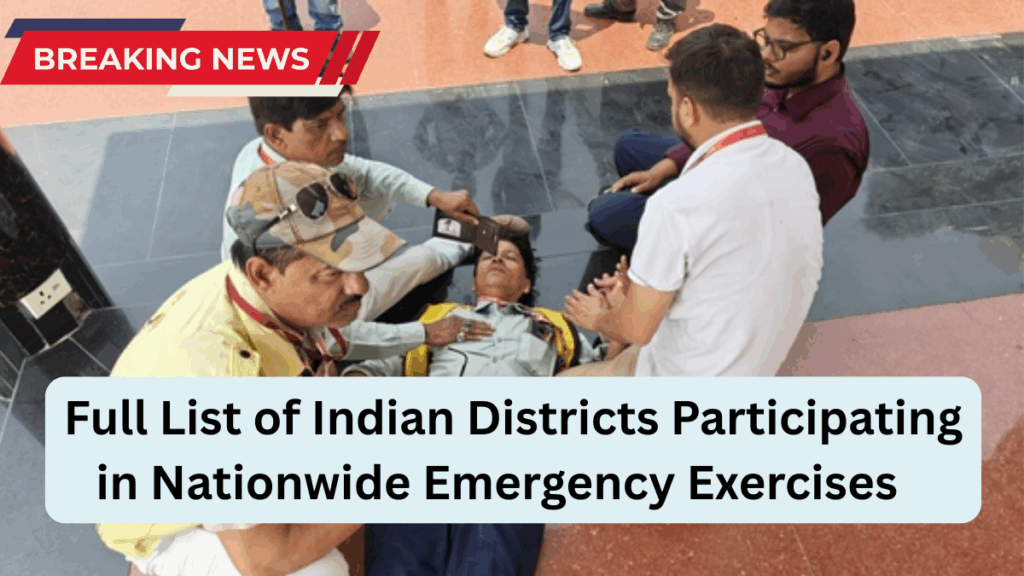To enhance emergency preparedness and evaluate response systems, India is set to carry out nationwide mock drills across several districts in 2025. These exercises are designed to simulate disaster scenarios and test the readiness of local authorities and citizens.

Table of Contents
What Are Mock Drills and Why Are They Important?
Mock drills are structured, pre-planned simulations of emergency situations aimed at:
-
Testing the preparedness of district and state-level authorities
-
Evaluating response times and coordination between emergency services
-
Educating the public on emergency procedures
-
Identifying gaps in current disaster management strategies
These drills are crucial not just for officials, but also for citizens who may be affected during real crises.
Organizers and Coordination
The National Disaster Management Authority (NDMA) is organizing the drills in coordination with:
-
State Disaster Management Authorities
-
District administrations
-
Police, fire, medical and rescue services
-
Local civic bodies and emergency response units
The initiative will be rolled out in phases across urban, rural, and industrial zones.
List of Districts Participating in 2025 M#ock Drills
Below is the list of districts included in the initial phase of the 2025 mock drill schedule:
State |
Participating Districts |
|---|---|
Maharashtra |
Mumbai, Pune, Nagpur, Nashik, Aurangabad |
Tamil Nadu |
Chennai, Coimbatore, Madurai, Tirunelveli |
Uttar Pradesh |
Lucknow, Kanpur, Varanasi, Agra, Gorakhpur |
West Bengal |
Kolkata, Howrah, Siliguri, Durgapur |
Gujarat |
Ahmedabad, Surat, Rajkot, Vadodara |
Delhi |
All 11 districts including North, South, East, West, Central |
Karnataka |
Bengaluru, Mysuru, Mangaluru, Hubli |
Rajasthan |
Jaipur, Jodhpur, Udaipur, Kota |
Odisha |
Bhubaneswar, Cuttack, Rourkela |
Assam |
Guwahati, Dibrugarh, Silchar |
Kerala |
Thiruvananthapuram, Kochi, Kozhikode, Thrissur |
Punjab |
Ludhiana, Amritsar, Jalandhar, Patiala |
Bihar |
Patna, Gaya, Muzaffarpur, Bhagalpur |
Telangana |
Hyderabad, Warangal, Nizamabad |
Madhya Pradesh |
Bhopal, Indore, Jabalpur, Gwalior |
Note: More districts are expected to be added in later phases during the year.
Types of Emergency Drills Being Conducted
Mock drills will simulate various emergency situations including:
-
Earthquake evacuations in schools, offices, and public buildings
-
Fire evacuation and control drills in commercial and residential spaces
-
Chemical hazard response operations in industrial zones
-
Flood rescue and evacuation in low-lying and flood-prone areas
-
Counter-terrorism response drills in high-security urban zones
Each exercise will involve:
-
Emergency sirens and alerts
-
Evacuation procedures and crowd management
-
Deployment of fire, police, NDRF, and medical units
-
Observation and real-time reporting for performance evaluation
Citizen Participation and Preparedness
Public awareness and participation are essential for the success of these drills. Citizens are encouraged to:
-
Follow official instructions without panic
-
Cooperate with authorities and participate actively
-
Join local disaster management workshops and training sessions
-
Keep emergency kits and contact lists updated
-
Understand the evacuation routes specific to their neighborhood
Mock drills are meant to build a culture of preparedness and resilience in the community.
Drill Timeline and Regional Coverage
Here is a timeline showing the expected coverage throughout the year:
Time Period |
Regions Covered |
|---|---|
Jan – Mar 2025 |
Western and Southern India |
Apr – Jun 2025 |
Northern and Central India |
Jul – Sep 2025 |
Eastern and Northeastern India |
Oct – Dec 2025 |
Nationwide review, evaluation, and follow-up drills |
Each participating district is expected to conduct at least one full-scale mock drill per quarter, along with smaller drills and training events in between.
Frequently Asked Questions (FAQs)
1. Will residents be notified before the mock drills take place?
Yes, local authorities will inform residents, schools, and businesses in advance through official announcements and media briefings to prevent panic.
2. Do mock drills interrupt normal public services or transport?
Minor disruptions such as roadblocks or brief closures may occur, but they are managed to minimize public inconvenience.
3. Can the public volunteer for these drills?
Yes, many districts welcome volunteers to assist with community education, role-playing, and first-aid demonstrations.
4. What happens after a drill is completed?
Officials conduct a thorough assessment to evaluate the response, identify weaknesses, and refine disaster management protocols.
Conclusion
Mock drills are a proactive approach to disaster preparedness. By involving citizens, emergency services, and government bodies in a coordinated manner, India is strengthening its ability to respond effectively to crises. These exercises serve as essential rehearsals to save lives and reduce chaos during actual emergencies.
Click here to learn more
